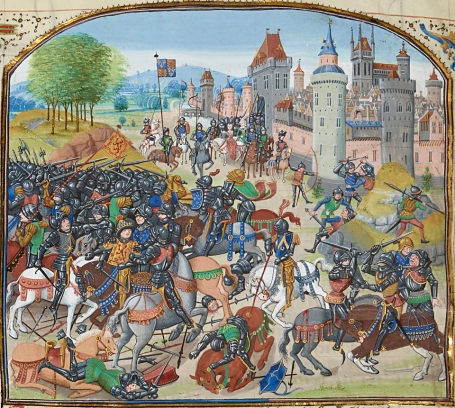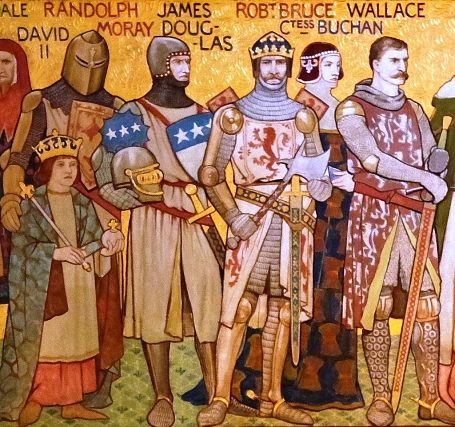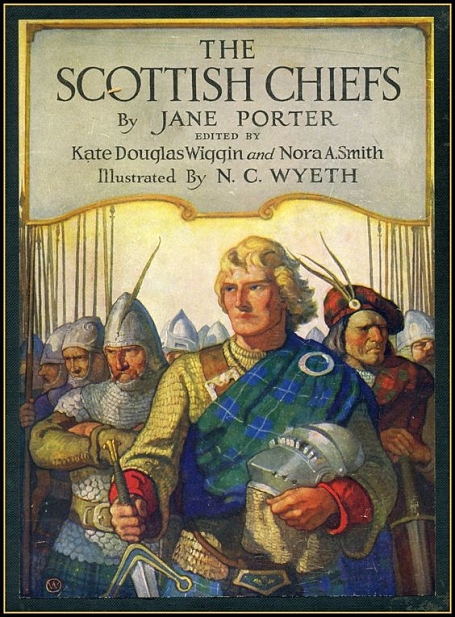The Life and Heroick Actions of the Renoun'd Sir William Wallace,
General and Governour of Scotland
by William Hamilton of Gilbertfield
Book XI, Chapter II
How WALLACE met with John Lynn at sea.
Along the English Coast they steered South,
Till opposite they came to Humber Mouth,
Then in the Sea a Ship did soon descry,
And on the Top, Three Leopards standing High.
Which when the Merchants narrowly did view,
Discourag'd were, and did their Voyage rue;
Knowing full well that it was John of Lyn,
Scots Blood to shed, who never thought it Sin.
Good Wallace smil'd and said, "Be not dismay'd,
Of one poor single Ship, why thus afraid?
Those Wood Cats fled us, and were frighted sore,
When Twice so many oftentimes before
On a fair Field, so shall they be at Sea,
If South'ron they, and we true Scotsmen be."
"That he's a Pirat," said the Steers-Men, "know,
And saves no Scotsman be he high or low.
A Flood he bears on his Armorial Coat,
First kills, then drowns; what Mischief does he not?"
Wallace reply'd, "Since that the Case is so,
I'll sail the Ship, you Cowards get below!"
Then his brave hardy valiant Men and he,
Array'd themselves in Harnish Cap-a-Pee.
Himself and Blair and the Knight Longoveil,
Command the Mid-Ship, and defend it well.
Before were Eight, Six he be-aft did send,
And Two he caus'd unto the Top ascend.
Gray Steers-Man was, which when the Merchants saw,
They Courage took, altho' but Sogers raw.
Some Skins with Wool they hastily did stuff,
This was their Harness, 'stead of Steel and Buff.
At which good Wallace very gently smiles
But does Commend their artificial Wiles.
Then John of Lyne, with Seven-score in his Barge,
Comes up and calls to Strike a hasty Charge.
At which Three Arrows, Blair with a good will
Shot, and a Pirat at each Shot did kill.
The Bloody Rogues, and cruel Hellish Hounds,
Before they clasp'd, Mischiev'd the Scots with Guns.
But when they clasped, this I wot right weel,
The Scottish Spears did pierce their finest Steel.
The Pirat's Shot drove thick as a Hail Show'r,
Most furiously, the space near of an Hour.
When Shot was gone, the Scots do Courage take,
And with stout Handy Blows great havock make.
The Merchants in their Woollen Harness then,
Behav'd themselves also like gallant Men.
Wallace and his, with sharp Swords furiously,
Cut down the Rogues and made them quickly die.
Then John of Lyn was very much aghast,
To see his Men about him fall so fast.
With eager will he would have been away,
Bade tack the Ship in all the hast they may.
But all in vain, for now he plainly sees,
His Sails by Crawford set unto a Bleeze,
Burn'd down in Ashes, without all Remead,
And Sixty of his best Men lying dead.
Boarding the Pirat, Wallace in the Sea
Did throw a Rogue, then killed other Three.
Brave Longoveil the Knight and Mr. Blair,
No Quarters gave to any they found there.
Off John of Lyn, Wallace the wight and brave,
The Head and Helmet from his Body drave.
And then his Men did cut down all the rest,
That did so long the Seas before infest.
Then to the Sluys straightway did Wallace sail,
With a successful and a prosp'rous Gale.
Took all the Gold and Silver that he fand,
The Merchants got the Ship, then he to Land.
Thro' Flanders rode, soon passed o'er the same,
Then entered France, and unto Paris came;
Which Tidings came unto the King in hast,
To whom good Wallace was a welcome Guest.
Unto the Parliament the King did then,
For a good Lordship Wallace recommend.
Who, 'cause that Guyen was out of their Hand,
They thought it best to gift him all that Land.
For well they knew he bravely fought before,
And did the South'ron mortally abhor.
This Decreet soon they shew'd unto the King,
Who highly was displeased at the Thing.
But Wallace said no Land pleas'd him so well,
And that the South'ron they should quickly feel.
Immediately the King he made him Knight,
And gave him Gold for to maintain his Right.
And order'd all the Army of that Land,
For to obey what Wallace did Command.
"I thank you, Sir," said he, "for this Reward,
Yon South'ron, Faith, shall be no longer spar'd.
And now my Time I will no longer waste,
But to the Wars I will prepare in hast."
The Scotsmen all that were into that Land,
About him flock'd and came with Heart and Hand.
With Longoveil, a num'rous Force arose,
And to the Wars all with good Wallace goes.
Ten Thousand Men in Number then were they,
Who did the Scottish Banner soon display.
To Guyen march'd all those good Men and true,
Cast Castles down, and many South'ron slew.
They carry'd all before them, in a Word,
None could, or durst, resist their Fire and Sword.
Scemen, which Wallace took before, they win,
And kill the South'ron all were found therein.
Into that Town Wallace made his Abode,
And did subdue all that whole Country broad.
The Duke of Orleans with Twelve Thousand bright,
Came to assist him and defend his Right.
Thus in his Town I leave him fairly fix'd,
And must speak something now of Scotland next.
The ballad, The Life and Heroick Actions of the Renoun'd Sir William Wallace, General and Governour of Scotland, by William Hamilton of Gilbertfield, 1722, is in the public domain.

The Kingdom of England and the Kingdom of Scotland fought dozens of battles with each other. They fought typically over land, particularly Berwick-Upon-Tweed, and the Anglo-Scottish border frequently changed as a result. Read more at Wikipedia.

The First War of Scottish Independence was the initial chapter of engagements in a series of warring periods between English and Scottish forces lasting from the invasion by England in 1296 ... Read more at Wikipedia.

Digitized version of The Scottish Chiefs, by Jane Porter, a novelization published in 1921 by Charles Scribner's Sons, about William Wallace and the First Scottish War of Independence. Read online at archive.org.